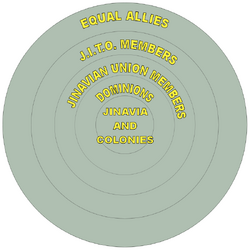
A scheme showing the general approach to the foreign policy of Jinavia. White spaces consist of neutral or hostile countries.
The foreign policy of Jinavia is organized on five concentric circles. Both between JU-Members (Jinavia, Dominions and Protected States) and only-JITO members, the Jinavian political, economical and social co-operation is strongly encouraged, in order to form a regional community of mutual friend countries, although led by the Jinavian Empire.
Outside the fouth sphere of influence of the Empire there are states with which the Empire has allied himself in a position of equality and bland co-operation.
The Empire and the Commonwealth[]
At the innermost level there are the Empire of Jinavia (metropolitan territory) and its colonies, framed into the Jinavian Colonial Commonwealth, which are in no way independent.
Dominions[]
The Dominions are independent kingdoms in personal union with the Emperor, and are dependent on the corresponding Jinavian ministries on the conduct of foreign and military policy. They share the Colonies with the Empire but are considered part of the second innermost level and indivisible part of the Empire of Jinavia. While colonies are ruled by Ministry of Colonial Affairs through Viceroyal administrations, the Dominions have the Governors as substitutes of the Sovereign.
Dominions are the Kingdom of Serbjieza, the Grand-Principality of South Serbjieza and the Empire of Nigestria.
[]
The third innermost level is formed by the Jinavian Union, which includes the Protected States. The Jinaivan Union is a supranational entity led by the Empire and includes the Dukedom of Vostroyia, the Ymerodraeth yr Gwlad Glas and the Republic of Uriankhai. The Jinavian Union consists of semi-independent countries which have surrended to Jinavia and, therefore, are autonomous: however, they have close cultural ties with the main country.
JITO-non-JU States[]
The Prime Minister of the Empire Count David Ulrich Maria Sebastian Knut von Brixen-Innichen (right) talking with President of Council of Ministers of Republic of Yttaly Federico Arre (left). The Republic of Yttaly is the closest independent ally of Jinavia.
At the fourth level are states allied in a position of strategic and economic inferiority.
Both the Union membes and the third level-allies are integrated into the regional organization (JITO - Jinavian Treaty Organization), but the military devices of the JITO States which are not Jinavian Union members in case of war are not integrated in the imperial command, but are only coordinated by the Empire.
Although independent and fully autonomous, these countries have close cultural ties with the main country.
[]
The Jinavian Sphere Police Office (JISPOL) is the Jinavian sphere of influence's criminal intelligence agency.
JISPOL allocates its resources (12,410 staff, of these, approximately 1,000 Jispol liaison officers (JILOs)) from its headquarters in Saint Basilsburg. The size of Jispol belies the fact that they are in constant liaison with several different law enforcement organisations, each with their own individual or group seconded to assist Jispol's activities.
Jispol covers all member states of the JITO, Jinavian Union and Jinavian Imperium. Jispol is a multilateral intergovernmental and not supranational agency.
Functions[]
Jispol's aim is to improve the effectiveness and co-operation between the competent authorities of the member states primarily by sharing and pooling intelligence to prevent and combat serious international organized crime. Its mission is to make a significant contribution to the states' law enforcement efforts targeting organized crime.
Jispol has no executive powers. It is a support service for the law enforcement agencies of the member states. This means that Jispol officials are not entitled to conduct investigations in the member states or to arrest suspects, unless authorized in their capacity of national police/gendarmerie officers. In providing support, Jispol with its tools – information exchange, intelligence analysis, expertise and training – can contribute to the executive measures carried out by the relevant national authorities.
Three different levels of co-operation are possible, according the political situations of members of Jinavian sphere: The first one is technical co-operation or to provide training. The next step is strategic co-operation aimed at exchanging general trends in organised crime and how to fight it and the exchange of threat assessments. The top level of co-operation includes the exchange of personal data.
Authorities[]
The Directorate of JISPOL is appointed by the Council of the Interior Ministers. It consists of a Jinavian Director General (currently Ulrich Baaskavili) and 3 Deputy Directors, rotating among other members.
Jispol is politically accountable to the Council of Interior Ministers via the Management Board. The Council controls the appointment of Jispol's Director and Deputy Directors. It also controls budget, financed from member state contributions, and any legislative instruments it deems necessary for Europol. The Management Board is staffed with Interior Ministry officials with one representative from every participating member state. It meets at least six times per year and exercises political control over routine staffing and budgetary matters.
Financial supervision over Jispol is aided by a committee of auditors drawn from the membership of the members' auditoral services and is known as the Joint Audit Committee.
